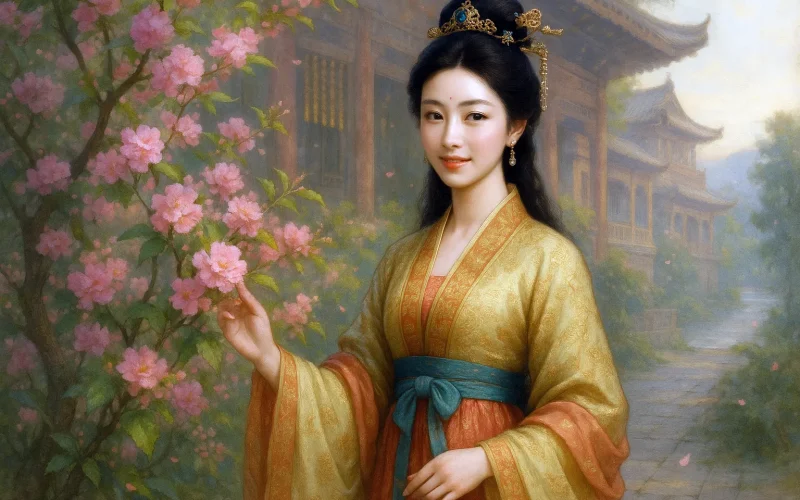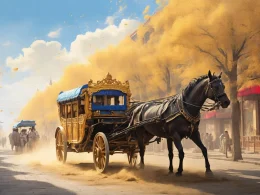How can a deep love seem deep love,
How can it smile, at a farewell feast?
Even the candle, feeling our sadness,
Weeps, as we do, all night long.
Original Poem
「赠别二首 · 其二」
杜牧
多情却似总无情,惟觉樽前笑不成。
蜡烛有心还惜别,替人垂泪到天明。
Interpretation
"Parting" was written around 840 AD during the reign of Emperor Wenzong of the Tang Dynasty. This poem is one of two farewell poems Du Mu wrote to a songstress during his time as an aide in Yangzhou. Frustrated in his career and facing personal hardships, Du Mu found solace in his relationship with the songstress. As they prepared to part, he composed this poem to express the ineffable pain of separation, continuing the emotional depth of the first poem.
First Couplet: "多情却似总无情,惟觉樽前笑不成。"
Duō qíng què sì zǒng wú qíng, wéi jué zūn qián xiào bù chéng.
Though full of affection, I seem indifferent; at the wine table, I try to smile but cannot.
These lines capture the complex and suppressed emotions of parting. The phrase "full of affection" (多情) suggests deep feelings, but the poet appears "indifferent" (无情) in the face of separation. This contradiction reflects the overwhelming nature of his emotions, which make it difficult for him to express his true feelings. At the wine table, he attempts to smile but fails, vividly portraying the unspeakable sorrow of parting.
Second Couplet: "蜡烛有心还惜别,替人垂泪到天明。"
Là zhú yǒu xīn hái xī bié, tì rén chuí lèi dào tiān míng.
The candle, as if with a heart, grieves at our parting; it sheds tears on our behalf until dawn.
In this couplet, Du Mu personifies the candle, attributing to it the ability to feel and grieve. The "tears" (垂泪) of the candle, which are actually drops of melted wax, symbolize the poet's own sorrow. The phrase "until dawn" (到天明) suggests that the farewell gathering lasts all night, emphasizing the depth of their reluctance to part.
Overall Appreciation
This poem conveys the profound sorrow of parting without explicitly using words like "sadness" or "grief." Instead, Du Mu uses subtle imagery and personification to express his emotions.
The first couplet captures the poet's internal conflict. His deep affection makes it difficult for him to express his feelings, leading to an appearance of indifference. The attempt to smile at the wine table, only to fail, vividly portrays the unspeakable pain of separation.
The second couplet shifts to a more symbolic expression of sorrow. By personifying the candle and describing its "tears," Du Mu creates a poignant image that conveys the depth of his grief. The candle's tears, lasting until dawn, symbolize the prolonged and intense nature of their farewell.
The poem's strength lies in its ability to convey deep emotion through subtle and elegant imagery. Du Mu's use of personification and his focus on small, poignant details create a powerful and lasting impression.
Writing Characteristics
- Complex Emotions, Subtle Expression
The poem captures the poet's internal conflict and suppressed emotions, expressing deep sorrow without explicit language. - Personification and Symbolism
The personification of the candle and its "tears" symbolize the poet's own grief, creating a poignant and memorable image. - Elegant Language, Deep Resonance
The poem's language is simple yet elegant, conveying deep emotion with subtlety and grace.
Insights
This poem offers a profound meditation on the pain of parting and the complexity of human emotions. Du Mu's portrayal of his internal conflict and his use of symbolic imagery resonate deeply, reminding us of the importance of expressing our true feelings and cherishing the moments we have with loved ones.
The poem also highlights the power of subtlety and symbolism in conveying deep emotion. By focusing on small, poignant details, Du Mu creates a powerful and lasting impression, challenging us to find meaning and beauty in the everyday.
Ultimately, "Parting" is a meditation on the pain of separation, the complexity of human emotions, and the importance of cherishing the present moment. It encourages us to reflect on our own lives and to seek out the beauty and meaning in the relationships we hold dear.
Poem translator
Kiang Kanghu
About the poet

Du Mu (杜牧), 803 - 853 AD, was a native of Xi'an, Shaanxi Province. Among the poets of the Late Tang Dynasty, he was one of those who had his own characteristics, and later people called Li Shangyin and Du Mu as "Little Li and Du". His poems are bright and colorful.












